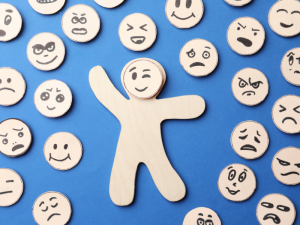Pressure and stress are essential; they touch every aspect of our everyday life; helping us complete tasks, allowing us to learn new things and to be creative, and one is needed for our survival.
There is an optimum level of pressure that brings about our best performance, allows us to take on new challenges hit targets, meet deadlines or accept change, but crucially we feel in control. Stress, on the other hand, occurs when the pressure rises and we feel unable to cope.
Science defines stress as the feelings of being under too much mental or emotional pressure. While most of us have experienced events that can induce a short-term stress response also known as “fight, flight or freeze”, for example; a fire engine with its blues and twos whizzing past, these incidents are not harmful to our wellbeing, in fact, they are allies. It’s the long-term stressors which can become a nemesis and can be detrimental to our health, anything from significant life events such as bereavement, redundancy or divorce. To relationship difficulties, ongoing family illness, work pressure or problems with our health. It is impossible to avoid stress, feelings of stress or anxiety can bookmark even the happiest events of life such as weddings and parenthood.

Stress is only harmful to our wellbeing when it becomes overwhelming and interrupts the balance in our nervous system. It can affect our thoughts, our feelings, and our
When our mind perceives a threat (real or imagined), the body responds by quickly releasing hormones and chemicals in the bloodstream and then into to targeted areas in the body to bring about specific physical, mental and emotional reactions that intensify the body’s ability to deal with the ‘threat’.
Think of this reaction as a boost or “super-power”; we have all heard the stories of ordinary people who have lifted a car to free a trapped person underneath. In these cases or when we need to protect ourselves, this is an appropriate and handy ‘super’ response, but if this state of stress response persists, it can cause a variety of symptoms including aches and pains, headaches, digestive symptoms such as IBS, poor sleep or insomnia, anxiety, panic attacks, or odd symptoms such as rashes or tingling in the hands. Doctors also link weight gain, especially around the waist to prolonged stress, even mood changes, depression, or unexplained emotions such as anger or sadness can be the result of prolonged periods of stress. A vicious cycle is often the consequence, which exacerbates the typical stress response, and around it goes.
Adrenaline, Cortisol, and Noradrenaline are the chief chemical messengers and hormones released during a stressful event. They increase heart rate, make us breathe faster, make muscles tense and increase our strength, but they also depress the immune response lowering our ability to fight infection and resist

Research has shown that people who feel under persistent stress are at risk of short-and long-term health consequences. Stress hormones cause blood vessels to constrict, and while this is beneficial when there is in real danger, it can become detrimental because continuous blood vessel constriction can cause an increase in blood pressure, which is often a symptomless condition.
The body reacts every time we perceive a threat, remember that doesn’t have to be real, the sabre-toothed tiger we face today is more like to be work pressure, commuting problems or a family crisis, but our body emergency system responds the same way. We may not notice the effects of stress response or be able to stop them, it takes awareness and training to slow a pounding heartbeat or rising blood pressure. In most cases, we can recover relatively quickly from these episodes, but sometimes, it may take 30 minutes or more to restore balance.
Ultimately, effective stress management requires and multidisciplinary approach. As an osteopath, mindful movement coach a health educator, I see people with wide range of physical symptoms including joint and muscles symptoms, for a significant number ongoing stress is a major contributing or maintaining factor. One of the basic tenets of osteopathy is that the mind and body are interdependent. Feeling fatigued or stressed goes hand in hand with aches and pains.
The stress response is a superb example of the direct effect of our emotions and thoughts on our body. Fortunately, it can work the other way too; feeling comfortable in one’s body, with the ability to breathe easily can have a powerful restorative effect and aid our ability to manage the ups and downs of life. When we are functioning optimally our body, and its cocktail of hormones and chemicals are in a balance which means we respond appropriately to our internal world and the external environment. My patients often report having a better night’s sleep after treatment, wake more refreshed, feel less stressed and able to gain a better sense of control.

Experience tells me that most people would like to improve their wellbeing, and while solutions can come in many forms, I believe it starts with education and creating time to find a sense of peace. I work in a busy, vibrant city which I see as a forest to navigate, rather than a jungle to battle through. Sometimes that’s through bright sunshiny skies, other times through slithers of light, but while I feel well resourced, I can never totally avoid the shadows of stress or dodge the uneven ground or slippery surfaces, those who know me will understand this reference to my recent bad fall and the resulting long period of OUCH!
The ability to bounce back from illness, setbacks or adversity is essential to help people thrive; this is also called resilience. Some people are born with it in abundance but we can all learn it too. While exploring change and self-care might sound like a cliché that makes your toes curl, creating time for ourselves is a basic human need, and everyone needs a sense of sanctuary, it’s one of Maslow’s hierarchy of needs. Most people need a catalyst for change; fortunately, research has shown that just one day can provide enough physical and mental space to explore meaningful ways to rebuild resilience or make a positive change to manage the inevitable bumps in the forest of life.

This summer I will be sharing the best of my nearly 20 years of experience around total wellbeing, debunking myths, clarifying the evidence that works, anchoring these theories with mindful practical sessions on an off a mat and adding in a sprinkling of authentic age-old wisdom. Along, with strategy coach Toni Horton we have planned a relaxed, informative day of revitalisation based on the graceful and peaceful elegance of Bell House Dulwich. It would be lovely if you could join us. Details, ticket details and booking information is on our Eventbrite page, here’s the link which opens in a new tab. eventbrite/







